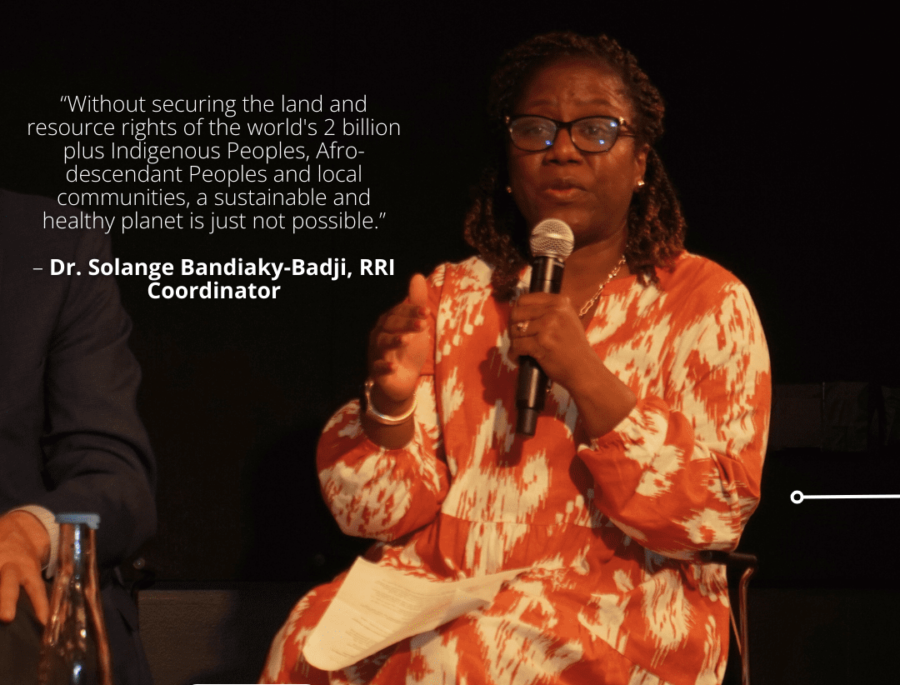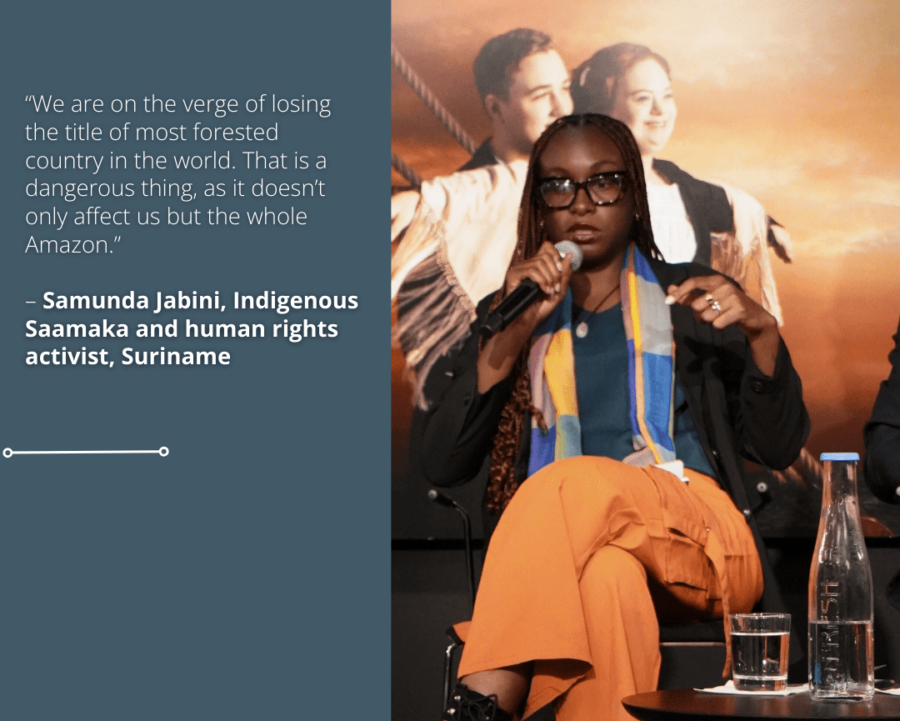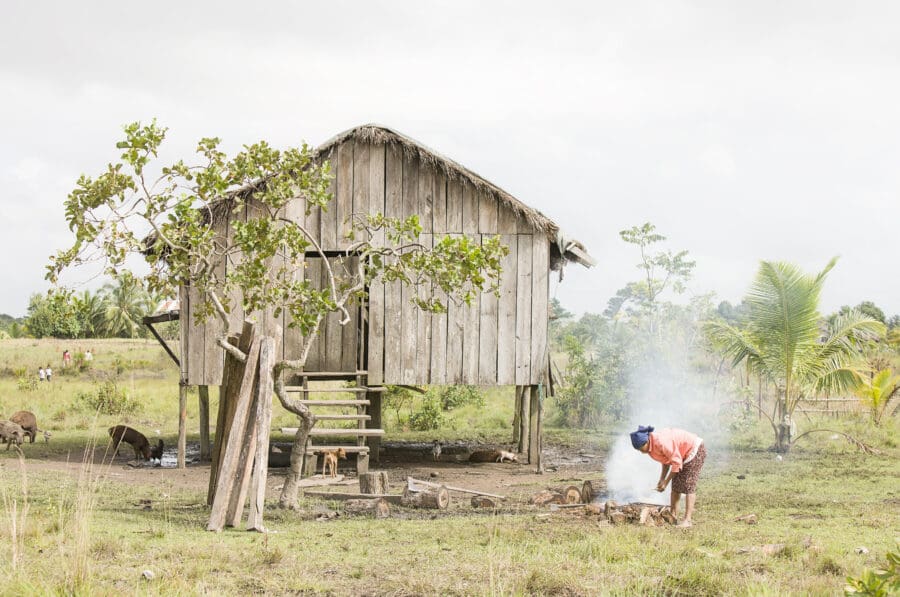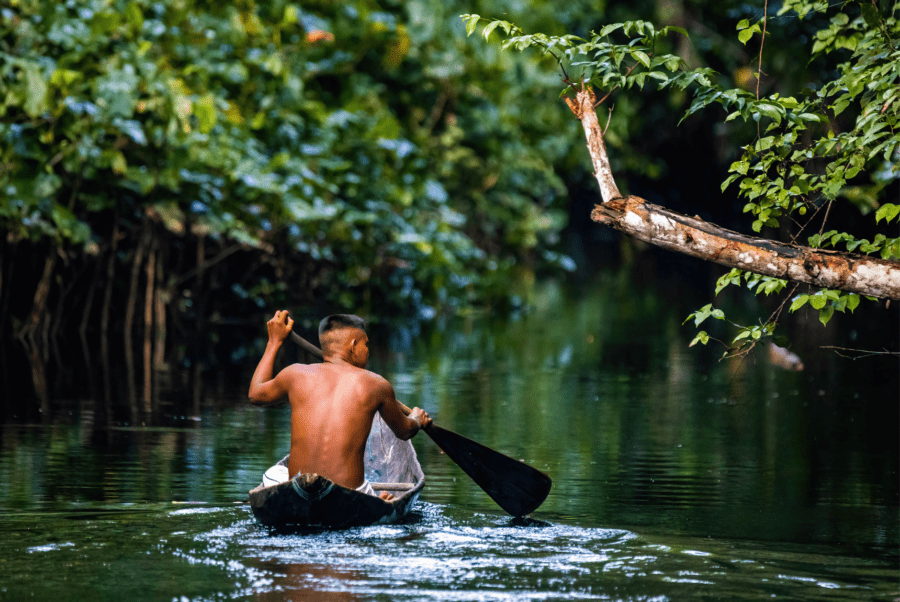
In the midst of the global climate crisis, it has become increasingly evident that protecting Indigenous Peoples’, local communities,’ and Afro-descendant Peoples’ tenure rights is not only a matter of social justice but also a critical strategy for environmental conservation. As Chris Jochnick, CEO of Landesa, aptly put it at a discussion organized by RRI last week on Securing Land Tenure for Climate Action, “Climate change has lit a fire under the need and urgency for land rights.”
Yet, despite increased global recognition of the link between securing these rights and mitigating climate change, there remains a significant gap between commitments made on paper and tangible actions on the ground.
On May 15, RRI co-organized a multi-sector Dialogue on Securing Land Tenure for Climate Action in Washington, D.C. along the sidelines of the World Bank Land Conference. The packed event, hosted by the Embassy of Sweden in the USA and co-organized with Cadasta Foundation, Land Portal Foundation, Landesa, and Forest Trends, brought together a diverse panel of key international actors moderated by Amy Coughenour, CEO of Cadasta Foundation. The panelists and participants included representatives from the global donor community, governments in the Global South, Indigenous and local community rights-holder groups, and civil society.
Unpacking the Challenges and Opportunities in Securing Tenure
The dialogue featured a candid discussion on the major challenges and opportunities in securing land rights for Indigenous Peoples (IP), local communities (LC), and Afro-descendant Peoples (ADP) for climate action. The event also included a celebration of the 15th anniversary of the Land Portal Foundation, which advances open knowledge and dialogue on community land rights across the world.
The panelists included:
- Sandrina Randriamananjara Anjary, Secretary General, Ministry of Decentralization & Regional Planning, Madagascar
- Samuda Jabini, Community Engagement Advisor, Association of Saamaka Communities, Suriname
- Chris Penrose-Buckley, Senior Advisor, Land Policy, UK Foreign & Commonwealth Office for Development
- Cristián Samper, Managing Director & Leader for Nature Solutions, Bezos Earth Fund
- Solange Bandiaky-Badji, President & Coordinator, Rights and Resources Initiative
Each panelist shared insights from their work on how to collectively address the challenges of securing tenure rights across various sectors, including governments, development finance, the private sector, philanthropy, and within rightsholder communities. To tackle these challenges, they shared notable initiatives so far to scale up funding and support for community land rights and rights-based conservation efforts, particularly the IP and LC Forest Tenure Pledge and the Forest and Climate Leaders’ Partnership.

However, as noted by moderator Amy Coughenour, recent reports tracking the disbursement of funds have revealed that direct funding for communities is still falling short, with only a small fraction of the funding reaching their own organizations.
RRI President and Coordinator Solange Bandiaky-Badji highlighted that nearly two billion IPs, LCs, and ADPs serve as the guardians of 80% of the world’s biodiversity and 36% of the remaining intact forests.
“Without securing their land and resource rights, a sustainable and healthy planet is just not possible,” she said.
However, despite their vital role, only a fraction of these communities hold secure rights to own, manage, and control their land and resources. This imbalance not only undermines the rights of these communities but also threatens the very ecosystems they protect.
Advocacy, Transparency, and Compensation
To secure tenure rights, government assistance is crucial. In places like Suriname, land grabbing is often sanctioned by government actions, putting the biodiversity guarded by these communities at risk. Samunda Jabini, panelist and Indigenous Saamaka human rights activist warned, “We [Suriname] are on the verge of losing the title of the most forested country in the world. That is a dangerous thing, as it doesn’t only affect us but the whole Amazon.”

Samunda also shared the challenges faced by communities in accessing direct funding from donors, such as requiring extensive proposals in English.
“Most of our communities don’t read or write English,” she pointed out, encouraging donors to think out of the box and consider creative ways to submit proposals, such as through video.
“Let’s go to the communities and look at how we can make it easier for them to have access to funding. It doesn’t always have to go through middlemen,” she added.
Sandrina Randriamananjara Anjary from Madagascar’s Ministry of Decentralization and Regional Planning presented her country as an example of how government entities can, with political will, scale up local peoples’ rights and agency.
Sandrina highlighted that given the African island’s history as a French colony, most of its local communities never had land rights on the books. But since 2016, a project called The Agriculture Rural Growth and Land Management Project (CASEF) has initiated the first reforms for local communities’ acquisition of their ancestral lands.
“Moving forward, the land reforms that we are starting today must adapt to today’s realities…and to tomorrow’s realities, including climate adaptation in relation to land security.”
Transparency and accountability for donors are essential in ensuring that funding reaches the communities that need it most. Efforts such as the Forest Tenure Funders Group and the multisectoral network Path to Scale have brought together both bilateral and private philanthropies on the same platform to collectively play a crucial role in tracking funding and bringing transparency to the process. Chris Pennrose-Buckley, speaking on behalf of the UK Government’s Office for Foreign Development, acknowledged the limitations of bilaterals in expanding direct funding due to their obligations to taxpayers. However, he also noted that bilaterals still have an important role to play by influencing governments to adopt rights-based reforms.
“Where bilaterals have particular contributions to make is to support legal frameworks and the rule of law in countries, strengthen systems, and capacity building,” he said.
Chris added it is not enough to simply secure land rights; communities must also be compensated for the vital ecosystem services they provide. As guardians and caretakers of the planet’s natural resources, frontline communities are critical in mitigating climate change and preserving biodiversity.
Cristián Samper, representing Bezos Earth Fund, highlighted the role played by private philanthropies in increasing support for tenure rights in recent years. He also shared the challenges his Fund has seen in directing funding to rightsholders’ organizations in the regions it focuses on – the tropical Andes and the Congo Basin. While for some countries like Bolivia, the solution was to work through national associations, he noted that not all local Indigenous organizations feel represented by national-level associations.
“We have made a collective pledge of US$ 5 billion dollars and have already invested $1.8 billion since Glasgow. Almost 30% of this funding has gone to support Indigenous groups. Not all of it is direct — we could and should do more, but I think we are moving in that direction,” Samper said, adding that Bezos Earth Fund is “grateful to have RRI as a trusted partner” in achieving this goal.
Collective Action for a Sustainable Future
By bringing together leaders from governments, development finance, the private sector, philanthropy, and rightsholder communities, this dialogue sought to bridge the gap between various actors who each play a vital role in the ecosystem of rights-based climate action. We are thankful to the D.C. community and international participants who took the time to attend this event, and we hope that discussions like these will pave the way for greater dialogue, collaboration, and action to achieve a just and sustainable future for all.
Interested in receiving notifications about new blog posts? Subscribe to The Land Writes Blog now to get new posts delivered right to your inbox.








